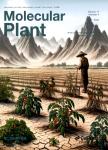The molecular basis of heat stress responses in plants
作者机构:National Key Laboratory of Plant Molecular GeneticsCAS Centre for Excellence in Molecular Plant SciencesShanghai Institute of Plant Physiology and EcologyChinese Academy of SciencesShanghai 200032China Joint Center for Single Cell BiologySchool of Agriculture and BiologyShanghai Jiao Tong UniversityShanghai 200240China University of the Chinese Academy of SciencesBeijing 100049China Guangdong Laboratory for Lingnan Modern AgricultureGuangzhou 510642China
出 版 物:《Molecular Plant》 (分子植物(英文版))
年 卷 期:2023年第16卷第10期
页 面:1612-1634页
核心收录:
学科分类:0710[理学-生物学] 071001[理学-植物学] 07[理学]
基 金:supported by the Shanghai Pujiang Program(22PJ1406500) the Shanghai Jiao Tong University 2030 Initiative(WH510363001-11) the National Natural Science Foundation of China(32388201 and 32201705) the Chinese Academy of Sciences(XDB27010104) the Laboratory of Lingnan Modern Agriculture Project(NT2021002) a project funded by the China Postdoctoral Science Foundation(2022T150648)
主 题:global warming thermosensing heat stress thermomorphogenesis heat stress responses heat acclimation
摘 要:Global warming impacts crop production and threatens food *** temperatures are sensed by different cell *** increases are classified as either mild warm temperatures or excessively hot temperatures,which are perceived by distinct signaling pathways in *** temperatures induce thermomorphogenesis,while high-temperature stress triggers heat acclimation and has destructive effects on plant growth and *** this review,we systematically summarize the heat-responsive genetic networks in Arabidopsis and crop plants based on recent *** addition,we highlight the strategies used to improve grain yield under heat stress from a source-sink *** also discuss the remaining issues regarding the characteristics of thermosensors and the urgency required to explore the basis of acclimation under multifactorial stress combination.



